Healthcare Compliance Audits
If you are looking for technology that helps you and your team eliminate manual logging, improve compliance readiness, and protect all your temperature-sensitive assets, you’ve arrived at the right place.

Let us help you evaluate your needs!
- Safety: Alerts via text, email, push notifications and phone calls to protect your precious assets
- Compliance: Automated compliance reports
- Efficiency: Reduced Manual Logging and time spent on reports
- Robust Redundancy: Battery Backup and DataSync for reliable data continuity
And what makes us different?
- Lifetime Warranty: Ongoing warranty included with monitoring subscription
- Unlimited Users: Scale across your entire organization
- Connectivity Flexibility: Wi-Fi, Cellular or Data Hub
- Phone call alarms: Alerts won't get ignored
- Mobile App: 500 Freezers in your pocket
- Facility monitoring: Simple to add water leak, door open, occupancy, and even IAQ monitoring
Engineered in Indiana with U.S.-based support.

Healthcare Monitoring
From the operating room to the cafeteria freezer, risks of a broken freezer or compromised clean room can range from the loss of tens of thousands of dollars in inventory to adverse patient outcomes.
Healthcare BrochureSee What Customers Say About Sonicu
Asset Protection. Compliance Automation. And Reduced Manual Processes.
Sonicu serves thousands of professionals at hundreds of organizations across North America by improving how they monitor and manage their most sensitive assets and environments.
Professionals from healthcare, life science, laboratory and cold chain facility management turn to Sonicu to help them improve the way they do business.

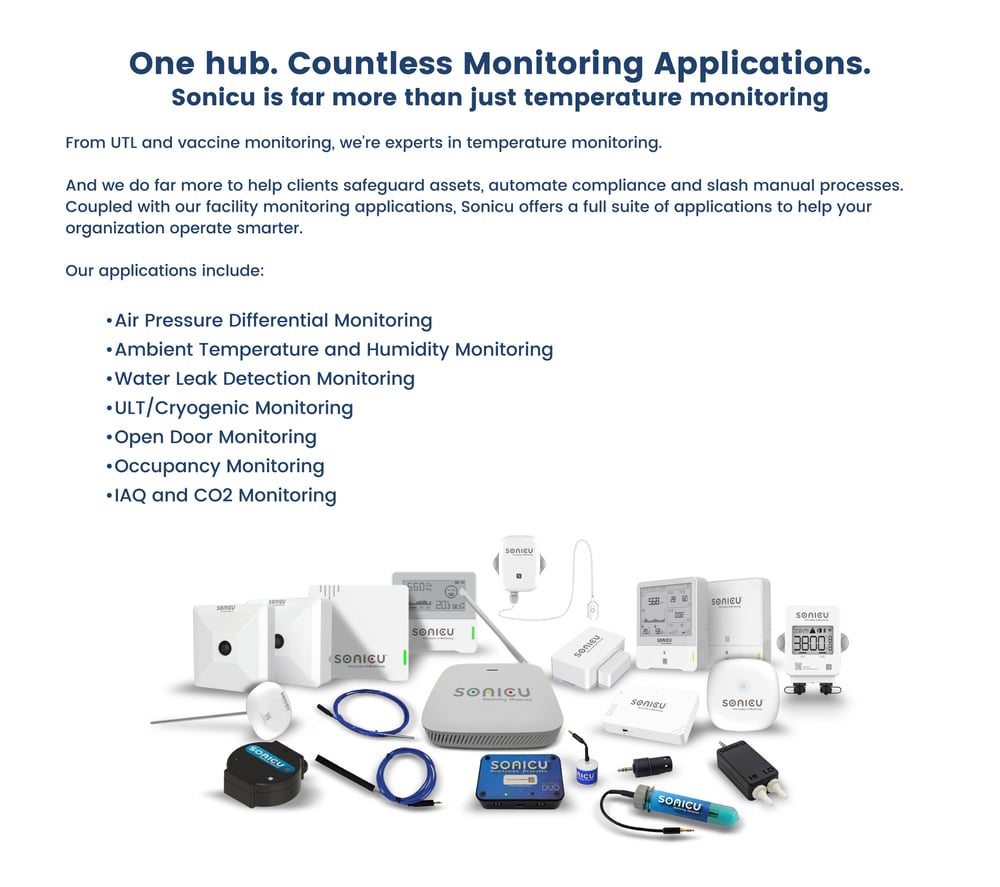
Some of the finest names in healthcare, including Indiana University Health, University of Michigan Health System, and Stanford University rely on Sonicu to provide a robust and continuous environmental monitoring system, including temperature, humidity, air pressure and more.
These respected healthcare and research brands turn to Sonicu for four primary reasons:
- Real-Time Monitoring: the sensors collect temperature, humidity, air pressure data and more, and transmit it wirelessly to SoniCloud - our cloud-based platform.
- Operational Efficiency: Virtually eliminate the need for tedious and costly manual logging
- Compliance Automation: Respond to any regulatory audit or inspection in a few clicks with our reports section
- Asset Protection: Detect and respond to any threshold that can threaten anything perishable: food, drugs, vaccines, research, etc.
One Hub. Countless Monitoring Applications.
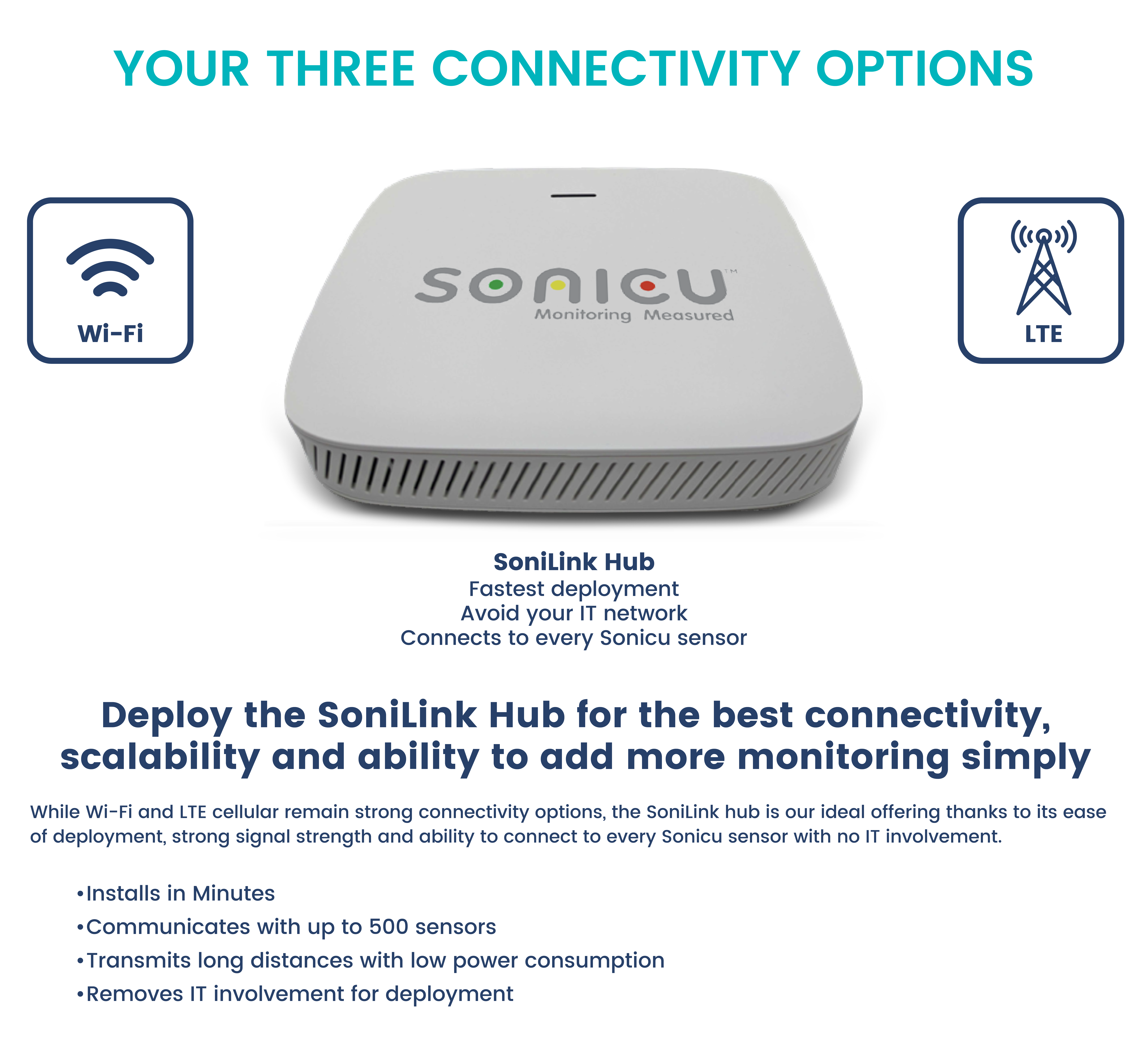

Before Sonicu, we had to don bunny suits to check the status of our cleanrooms. Now we check our phones and know right away. The system saves us time and effort and helps us respond to environmental

Beyond Checklists: The Transformative Role of Healthcare Compliance Audits in Patient Care
Healthcare compliance audits are essential mechanisms in the healthcare industry to ensure that facilities and providers are adhering to established rules, regulations, and standards.
Healthcare compliance audits are systematic reviews of healthcare operations and practices to ensure they are in line with established guidelines. These guidelines can come from various sources, such as federal and state laws, accreditation bodies, and even internal organizational policies.
Many regulations govern healthcare delivery, billing, and patient rights. Audits ensure facilities are adhering to these regulations, thereby avoiding negative legal consequences or penalties.
Healthcare institutions also deal with vast amounts of billing and financial transactions. Audits ensure that billing practices are accurate and that there's no fraud or waste, ensuring that healthcare providers receive fair payment and that patients or insurers are not overcharged.
Ensuring that patients receive high-quality care is crucial for healthcare facilities too. Audits can assess if care is being delivered according to established standards and best practices.
Also, audits can identify potential risks, which might include areas where patient safety is compromised or where there are vulnerabilities to fraud. Once identified, these risks can then be mitigated.
Through audits, facilities can also identify inefficiencies in their processes and then refine them, leading to better patient care and operational outcomes.
When healthcare facilities are regularly audited and meet compliance standards, it builds trust among patients, stakeholders, and regulatory bodies.
By ensuring that billing and other financial practices are accurate and compliant, healthcare facilities can also avoid costly penalties or reimbursements.
Additionally, regular audits mean continuous feedback. Facilities can take this feedback and use it to improve their services, leading to better patient outcomes.
Compliance with regulations also minimizes the risk of legal actions against healthcare facilities.
Lastly, a facility known for its compliance is more likely to have a good reputation, attracting both patients and top-tier professionals.
In essence, healthcare compliance audits play a vital role in ensuring that healthcare facilities operate within established guidelines, leading to better financial, operational, and patient care outcomes. They are foundational to the trustworthiness and efficiency of the healthcare system.
From automating complex and tedious regulatory reports to significantly reducing time spent on manual processes, Sonicu helps private, public, and government agencies focus on their core business and less time on monitoring their assets and environments.
What are the most notable regulations and guidelines healthcare facilities have to comply with?
Healthcare facilities in the U.S. (and similar regulations exist in many other countries) are governed by a myriad of regulations.
First of all, the Health Insurance Portability and Accountability Act (HIPAA) of 1996 is perhaps the most well-known U.S. healthcare regulation. It deals with the privacy and security of patient health information, ensuring that healthcare providers take necessary precautions to protect patient data.
The Affordable Care Act (ACA) of 2010, also known as Obamacare, is a legislation that reshaped many aspects of the healthcare system, focusing on insurance coverage, healthcare costs, and preventive care.
The Centers for Medicare & Medicaid Services (CMS) Regulations oversee the Medicare and Medicaid programs. They have various regulations on provider enrollment, billing, and quality of care for facilities participating in these programs.
The Clinical Laboratory Improvement Amendments (CLIA) of 1988 are regulations pertaining to laboratory testing and ensure that labs provide accurate, timely, and reliable patient test results regardless of where the test was performed.
The Occupational Safety and Health Act (OSHA) isn’t exclusive to healthcare, but it does have specific guidelines that healthcare facilities must follow, especially concerning the handling of biohazardous materials and ensuring a safe work environment.
The Emergency Medical Treatment and Labor Act (EMTALA) of 1986 ensures public access to emergency services, regardless of ability to pay. It primarily mandates that if someone comes to an emergency department, they must be stabilized and treated, regardless of their insurance status or ability to pay.
The Food and Drug Administration (FDA) Regulations oversee the safety and effectiveness of drugs, biologics, medical devices, and more. While this is broader than just healthcare facilities, providers must ensure that they're using FDA-approved methods and devices.
While not a governmental body, the Joint Commission (TJC) is a major accrediting organization for healthcare facilities. Its standards touch on patient safety, rights, and care outcomes.
These are just some of the major regulations and guidelines affecting healthcare facilities. Depending on the state or country, there may be additional or different regulations that healthcare providers need to be aware of. Compliance with these regulations ensures the safety and well-being of both patients and providers.
What are the penalties or legal ramifications for non-compliance in the healthcare sector?
The penalties and legal ramifications for non-compliance in the healthcare sector can be substantial and vary based on the specific regulation or guideline that is being violated. Here's a breakdown of some penalties associated with notable regulations:
- Health Insurance Portability and Accountability Act (HIPAA)
- Civil penalties can range from $100 to $50,000 per violation (or per record), with a maximum annual penalty of $1.5 million.
- Criminal penalties can range from fines of $50,000 to $250,000 and imprisonment for up to 10 years for individuals who knowingly misuse or disclose individually identifiable health information.
- Affordable Care Act (ACA)
- Employers that don’t provide adequate health insurance may face penalties, depending on the size of the employer and the specifics of coverage provided.
- Fraudulent activities related to ACA provisions, such as false statements on subsidy applications, can result in fines and imprisonment.
- Centers for Medicare & Medicaid Services (CMS) Regulations
- Overpayments, false claims, or fraudulent activities can result in fines, repayment obligations, and potential exclusion from federal health programs.
- Penalties for not meeting quality or reporting standards can also be levied.
- Clinical Laboratory Improvement Amendments (CLIA):
- Non-compliance can lead to suspension, revocation, or limitation of a laboratory's certification.
- Penalties can be up to $10,000 per day of non-compliance.
- Occupational Safety and Health Act (OSHA)
- Penalties for serious violations can be up to $13,653 per violation.
- Willful or repeated violations can result in penalties of up to $136,532 per violation.
- Emergency Medical Treatment and Labor Act (EMTALA)
- Hospitals can be fined up to $104,826 per violation, and physicians can be fined up to $50,000 per violation.
- Hospitals can also be excluded from Medicare and Medicaid for egregious violations.
- State-Specific Penalties:
- Each state may also have its own set of healthcare regulations with associated penalties.
Beyond financial penalties, non-compliance can have other serious ramifications, such as damage to reputation, increased scrutiny from regulatory bodies, increased auditing, potential lawsuits, and even loss of licenses or certifications, which can effectively shut down a healthcare facility or end a healthcare professional's career. Given the potential consequences, it's crucial for entities in the healthcare sector to invest in robust compliance programs and continually monitor their adherence to all relevant regulations and standards.
Sonicu is the simple, easy-to-install, and cost-effective way to easily maintain regulatory compliance and streamline any inspection or audit.
You can learn more about how our software helps compliance professionals in these case studies:
Problem: Pharmacy Suffered Too Much Humidity In New Wing, impacting Compounding Pharmacy
Solution: Affordable Humidity Monitoring that Delivered Powerful data to prompt contractors to fix improperly sized air handler
Problem: The dining department struck with regulatory violations
Solution: Enterprise-wide monitoring that automates regulatory compliance across all departments
Problem: Release of lead particles in battery projects
Solution: Mobile, affordable air pressure monitoring solution
How are healthcare compliance audits performed and what are parameters assessed by regulatory agencies?
Healthcare compliance audits are systematic evaluations to ensure healthcare providers and organizations adhere to established laws, regulations, and guidelines. The audit process typically involves a combination of document review, on-site inspections, personnel interviews, and sometimes patient interviews or surveys.
- Audit initiation
- Depending on the nature of the audit and the specific agency involved, the healthcare facility might be notified in advance. Other times, the audit might be unannounced.
- While some audits are routine, others may be triggered due to complaints, suspicious activities, or specific incidents.
- Data collection
- Auditors will request various records, including patient charts, billing records, policies and procedures, personnel credentials, and more.
- Physical inspections of the facility might be performed to check cleanliness, safety measures, equipment conditions, etc.
- Staff, leadership, and occasionally patients might be interviewed to gather more information about practices and patient care.
Here are common areas evaluated by federal and state regulatory bodies during healthcare compliance audits:
- Patient care and safety
- This includes evaluating the quality of care provided, patient outcomes, and the safety protocols in place.
- Medical record documentation:
- Ensuring records are accurate, complete, and maintained securely.
- Billing and coding accuracy
- Ensuring that services billed match the services provided and are coded correctly.
- Credentialing
- Verifying that all healthcare professionals are properly credentialed and licensed.
- HIPAA compliance
- Evaluating adherence to patient privacy and data security standards.
- Infection control
- Checking protocols for preventing and managing infections.
- Environmental safety:
- Ensuring facilities meet safety standards, such as fire safety and hazardous waste disposal.
- Staff training and competency
- Making sure staff receive proper training, particularly in areas like patient rights, safety protocols, and emergency procedures.
- Regulatory reporting:
- Ensuring any required reports, such as adverse events or certain diseases, are accurately reported to authorities.
- Policies and procedures:
- Evaluating if the facility has comprehensive policies and procedures and if they align with regulations.
- Risk management
- Confirming that there are systems in place to identify and manage potential risks.
- Audit report
- After the audit, the auditors will provide a report detailing their findings, including any areas of non-compliance.
- Corrective actions:
- If non-compliance issues are identified, the healthcare facility may need to create a corrective action plan to address these issues within a specified timeline.
- Re-audit
- In some cases, a follow-up audit may be conducted to ensure that corrective actions were effectively implemented.
It's worth noting that the specific areas of focus and processes might vary depending on the nature of the audit, the type of healthcare facility, and the regulatory body conducting the audit. For example, an audit by a state health department might differ in scope and focus from one performed by CMS or a private accrediting organization like The Joint Commission.
Asset Protection. Compliance Automation. And Reduced Manual Processes. Sonicu serves thousands of professionals at hundreds of organizations across North America by improving how they monitor and manage their most sensitive assets and environments.
What issues in the healthcare sector do healthcare compliance audits effectively address?
Healthcare compliance audits play a crucial role in identifying and addressing various pain points in the healthcare industry.
To begin with, audits can reveal lapses in care, errors in treatment, and inadequate safety protocols. By addressing these issues, audits contribute to improving patient outcomes and ensuring a high standard of care.
Healthcare billing and funding also involve large sums of money. Audits can detect fraudulent billing, overbilling, or other financial inconsistencies. By identifying these issues, audits can prevent loss of funds, ensure correct reimbursement, and maintain the integrity of healthcare financing.
With electronic health records becoming the norm, protecting patient information has also never been more critical. Audits evaluate the effectiveness of data security measures and adherence to privacy regulations, thus reducing the risk of data breaches or misuse of patient information.
Also, audits can reveal operational bottlenecks, outdated processes, or inefficiencies in care delivery. By highlighting these areas, healthcare providers can optimize operations, streamline care processes, and reduce costs.
The healthcare industry operates within a complex regulatory environment too. Non-compliance can lead to significant legal ramifications, financial penalties, and reputational damage. Audits ensure healthcare providers adhere to regulations, reducing their risk exposure.
Ensuring that medical staff are adequately licensed, credentialed, and trained is also vital for patient safety. Audits can reveal lapses in credentialing or training, ensuring that only qualified individuals provide care.
Stakeholders, including the public, benefit from transparent reporting of healthcare outcomes, financial matters, and other critical aspects of healthcare operations. Audits ensure accurate and transparent reporting, building trust and accountability.
Healthcare facilities should also have robust policies and procedures to guide operations and ensure consistency in care. Audits assess the adequacy and effectiveness of these policies, ensuring they align with best practices and regulatory requirements.
Finally, ensuring that patients' rights are upheld, from informed consent to access to their medical records, is a cornerstone of ethical care. Audits can detect lapses or violations in upholding patient rights.
In essence, healthcare compliance audits serve as a diagnostic tool to pinpoint areas of concern within healthcare operations. By addressing these pain points, audits help to elevate the standard of care, improve operational efficiency, protect sensitive data, and ensure the ethical and legal functioning of healthcare facilities.
Sonicu helps you reduce product losses and helps safeguard the quality and integrity of your most valuable assets. This not only improves compliance readiness but also ensures the protection of all temperature-sensitive assets throughout the supply chain.
You can learn more about how our software helps compliance professionals in these case studies:
Problem: Data loggers that were not on the cloud and cloud-based solution that only connected via wi-fi
Solution: Cloud-based solution with connectivity in wi-fi AND cellular for maximum flexibility and compliance readiness
Problem: Aging walk-in cooler with a faulty electrical system caused system failure and a loss of $5,000 in food
Solution: Simple and affordable temperature monitoring solution that protects costly food and automates compliance.
What role do environmental monitoring systems play in healthcare compliance audits?
Environmental condition monitoring systems are an integral part of compliance in many healthcare settings, especially in areas where the environment can directly impact patient care or the integrity of medical products.
Environmental condition monitoring systems track and document various environmental parameters to ensure they remain within required or optimal ranges.
- Temperature monitoring
- Many medications and vaccines have specific temperature requirements to maintain their efficacy. A deviation can render them ineffective or even harmful.
- Blood banks, tissue samples, and organ storage facilities have strict temperature requirements.
- In laboratory settings, many experiments or tests might require specific temperatures for accuracy.
- Humidity monitoring
- In operating rooms and patient rooms, excessive humidity can promote bacterial growth and contribute to infections.
- In storage areas, some medical supplies or medications might be sensitive to humidity levels.
- Air quality monitoring
- Monitoring for particulates, microbes, or specific gases can be crucial in areas like operating rooms, isolation rooms, or labs working with hazardous materials.
- Differential pressure monitoring
- Isolation rooms are used for patients with airborne infectious diseases, like tuberculosis, and require negative pressure to prevent contaminated air from escaping into other parts of the facility.
- Operating rooms typically require positive pressure to keep out potential contaminants.
- Lighting and sound
- In patient rooms, proper lighting and noise levels can influence patient recovery and comfort.
- In laboratories and imaging rooms, some tests or procedures might require specific lighting conditions for accuracy.
- Water quality monitoring
- Ensuring safe and clean water in healthcare settings is crucial to prevent potential infections or contamination.
- Radiation levels
- In facilities where radiological procedures are conducted, monitoring radiation levels ensures the safety of both patients and healthcare workers.
These systems typically come with features like:
- Real-time Monitoring - Continuous tracking of environmental parameters.
- Alerts and Notifications - Immediate alerts (e.g., SMS, email, alarms) if conditions move out of the set range.
- Data Logging and Reporting - Storing data for compliance documentation and providing detailed reports for audit purposes.
- Remote Access - Allowing authorized personnel to check conditions remotely, often through a cloud-based system or mobile app.
Ensuring compliance in these environmental conditions is not just about adhering to regulatory standards but is also crucial for patient safety, the efficacy of treatments, and the overall quality of care.
From cold and frozen temperature storage to ambient conditions like relative humidity and air pressure differential to specific needs like CO2 and VOC monitoring, Sonicu provides a full suite of monitoring solutions.
Beyond the Basics: How Environmental Compliance Shapes Excellence in Healthcare
In the intricate tapestry of healthcare, compliance isn't merely a box to check—it's the lifeline that upholds patient safety, fortifies trust, and underscores the unwavering commitment to quality care. From ensuring the potency of lifesaving vaccines with precise temperature monitoring to safeguarding patients from airborne diseases with differential pressure controls, the environmental conditions within healthcare facilities play a pivotal role.
Yet, it's not enough to just be aware of these parameters; one must have the right tools to vigilantly monitor, accurately report, and swiftly act upon any deviations. Every moment of non-compliance, be it a slight temperature fluctuation in a blood bank or heightened humidity in an operating room, can translate into tangible risks for patient wellbeing.
But here's the silver lining: embracing the right environmental monitoring solutions can transform these challenges into opportunities for excellence. So, as you contemplate the next steps for your healthcare facility, remember that compliance, at its heart, is about uncompromised care—and having the right tools is half the battle won.
Ready to elevate your healthcare compliance? Dive into a world of precision, reliability, and peace of mind with Sonicu's healthcare environmental monitoring solutions. Your commitment to patient care deserves nothing less. Invest in Sonicu today.
American-based Customer Support: Robust & Reliable High Touch Service
Software and technology is only as good as the people who stand behind it.
At Sonicu, that means our team of American-based customer success managers who are never more than a phone call away to help field and fix any service issues.
Our probes and sensors are placed in demanding frozen environments and our software literally sends billions bits of data monthly, meaning there’s always the potential for a hiccup on either the hardware or software.
We are committed to fielding every customer service request promptly and addressing our customer’s concerns promptly and professionally.
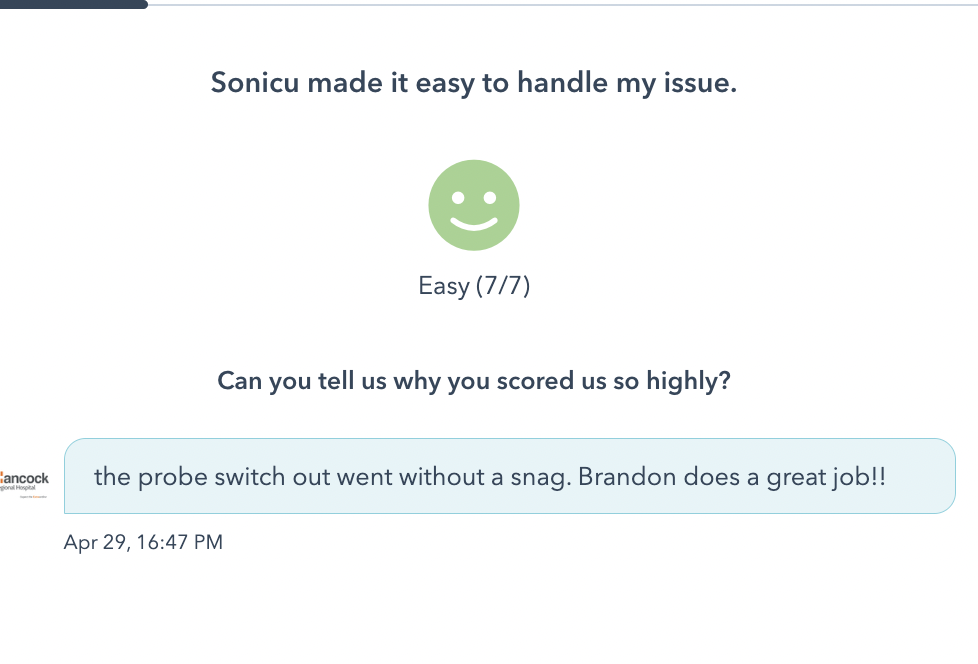
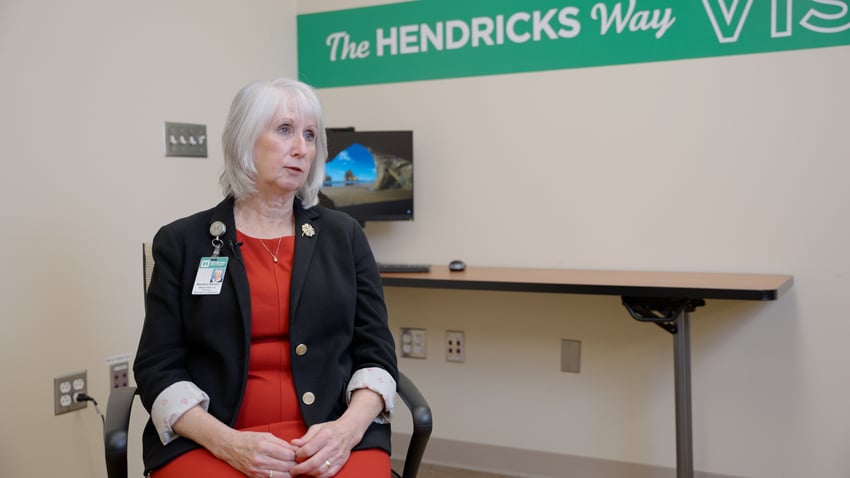 “I like to say that every refrigerator or freezer is like a car in that they all behave a bit differently,
“I like to say that every refrigerator or freezer is like a car in that they all behave a bit differently,
and then every now and then you just get a bad boy who doesn’t want to perform as we need it to,”
Martha Rardin, Director, Nutrition and Dietetics, Hendricks Regional Hospital.
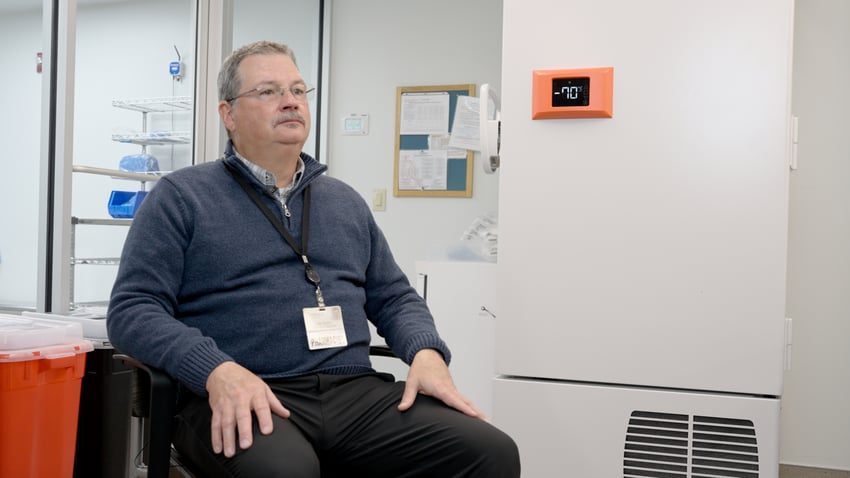 “Sonicu has been a powerful tool to identify which units are behaving out of spec and get our team
“Sonicu has been a powerful tool to identify which units are behaving out of spec and get our team
to fix them before we have a serious issue.”
Tim Livesay, Director, Hancock Regional Hospital Pharmacy Director





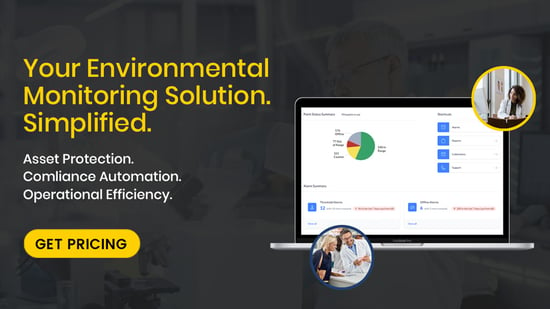
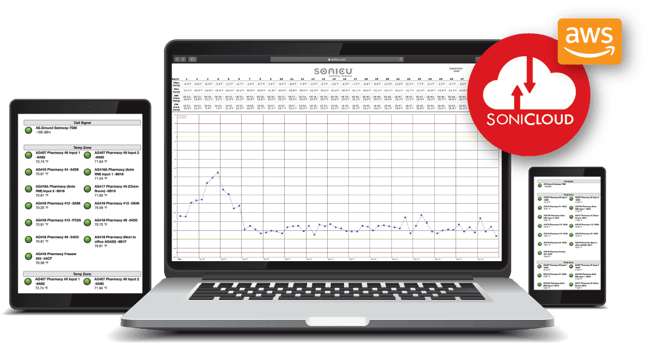
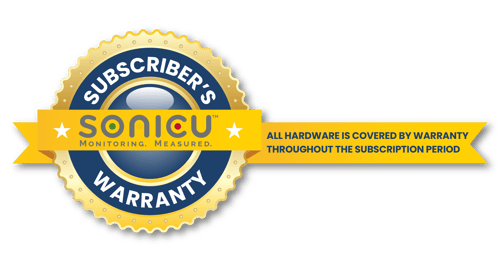


Before Sonicu, we had to don bunny suits to check the status of our cleanrooms. Now we check our phones and know right away. The system saves us time and effort and helps us respond to environmental